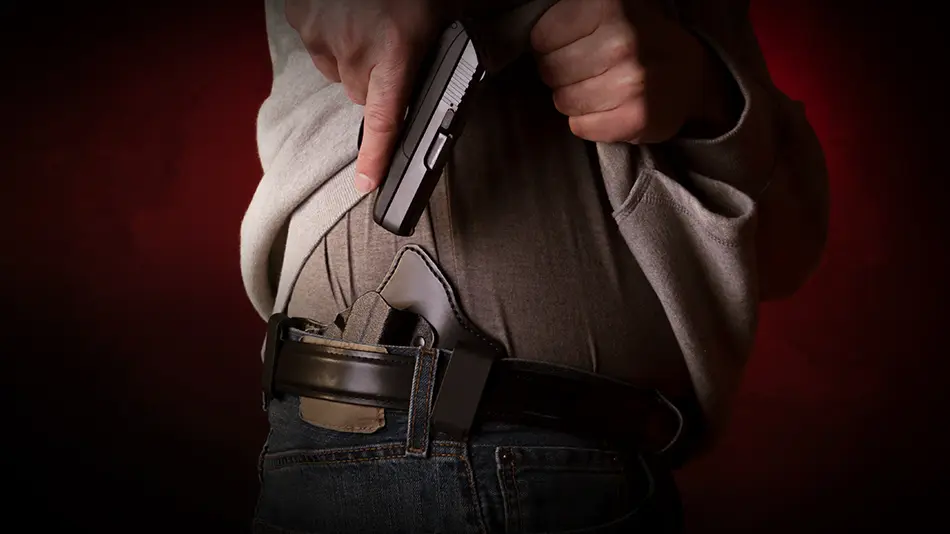The following is a video transcript.
You’re always prepared, and you follow the law. However, you’re only human, and sometimes, even the best planners can slip up. Let’s take a look at the top three mistakes that even the most responsible gun owners can make, and the easy steps you can take to avoid a worst-case scenario.
Forgetting Your Firearm is in Your Bag
Mistake number one—forgetting your firearm is packed in your bag. Remember, not knowing the law or breaking the law unintentionally is not a valid legal defense from a criminal prosecution. If you carry a firearm into a prohibited place like the secured portion of an airport, you could be arrested. For example, in Texas, if you have a valid License To Carry (LTC), and immediately depart with your firearm (as soon as law enforcement will allow), you may leave the airport, secure your firearm, and return to the security line. If you follow this procedure, you cannot be arrested in Texas.
However, this defense does not apply to federal laws and regulations, and you will likely receive a steep fine, as much as $13,000 in some cases, courtesy of the TSA. Be mindful that the LTC defense only applies to an airport mistake. The defense is not available to you if you carry into a prohibited area under Texas Penal Code Section 46.03 such as a school or a 51% establishment. Always be sure to inspect your bag inside your vehicle before you go into any secured area or prohibited place.
Improperly Documenting Transfers of Your Firearms
Mistake number two—improperly documenting transfers of your firearms. So, your brother lives across town and has always admired your 1911. You’re overcome by Christmas cheer and decide this year to give it to him. Because it’s a gift, you don’t really need any paperwork, right? While there is no legal requirement to do so, it’s always best practice to create a bill of gift or bill of sale when transferring firearms.
This document should contain the date of the transfer, the people involved in the transaction, the make, model, serial number, and a brief description of the firearm. What if your forgetful brother leaves his 1911 in the car, only to find the window smashed out and the gun gone? What if that stolen firearm is then used in a murder? With the transaction documented, you have the ability to show the police when the transfer took place. This precaution may mean the difference between a thank you from the police and a trip downtown.
Producing a Firearm in Your Vehicle as a Warning
Finally, mistake number three—producing a firearm in your vehicle as a warning. Threatening to use deadly force by producing a firearm, if done so as a warning you will use it if necessary, should only be treated as a use of force under Texas Penal Code Section 9.04. Simply put, if you’d be justified in using force (think—punching, tackling, or grabbing another in self-defense), you may be able to produce a firearm as a warning to stop another’s imminent use of unlawful force against you.
It sounds like a sensible option especially in Texas, which is a stand your ground state. Unfortunately, the vast majority of police officers and prosecutors don’t always see it that way when it comes to road rage. To them, a person in their big metal movable box has many options at their disposal. An officer’s first question would likely be, “Why didn’t you just drive away and call 911?” If you don’t have a good answer, you could be in legal trouble. In fact, it is one of the most common reasons we see people get arrested. In road rage situations, you would have to demonstrate at trial what you did was immediately necessary and reasonable under the circumstances. As the saying goes, “You can beat the rap, but you can’t beat the ride.” For that reason, exercise extreme caution when it comes to firearms on the road.
For any other legal questions or to discuss commonly made mistakes regarding firearms in Texas, call Texas LawShield and ask to speak to your Independent Program Attorney.





I am a bit concerned over the “document transfer” advice. I was under the impression that records documenting gun ownership held by the government had a relatively short shelf life to facilitate background checks. It would seem that manufacture to melt records of possession would be a de facto registration of gun owners. I realize by holding a LTC I am also creating a de facto registration as a gun owner, but that is at least a voluntarily generated inclusion to that list whereas the manufacture to melt chain of custody by transfer documents if kept in perpetuity would seem to exceed the need to facilitate background checks.
Hello James, please see this response from a Texas Independent Program Attorney:
James, I believe that there may be a misunderstanding with regard to the creation of the “transfer documents” keeping a bill of sale or a bill of gift is a privately created document that is held by the person selling or gifting the firearm. It is not required by law and it is not something that is filed with the government or sent to the police. This document is for the sole purpose of having a contemporaneous written record of the transaction to show that you were not in possession of the firearm if it is recovered in a crime. For example, Person A sells a gun to Person B after posting it for sale locally. Person A creates a bill of sale with all of Person B’s information along with the make, model, and serial number of the firearm. If this gun is recovered as evidence in a crime and the police trace the firearm back to Person A, he can then reference his record to accurately tell the police how long he has been out of possession of the firearm. While it is not an iron-clad guarantee that Person A will no longer be a suspect, having a written document memorializing the sale is much more credible than saying, “Oh, I sold that gun to some guy for cash in a parking lot a couple of years ago, but I can’t really remember any of the details.”
I understand the privately held record of disposition of the firearm, my real point of contention is if I bought a firearm ten years ago legally, filled out all the necessary paperwork to facilitate the required background check and today that firearm is recovered in a crack house raid how is it traced back to me? If there is a short shelf life for the record of who bought what firearm when and from whom how does it trace to the original purchaser a decade later? I know the current push is for all transfers of firearms to require the transfer procedure just as an initial sale from a licensed firearms dealer. Personally if I wanted to sell one of my firearms to someone I didn’t know well I would do it through a FFL dealer so I’m comfortable that I’m not arming a career felon, but that’s just me. The peace of mind to me is worth whatever the FFL dealer charges me to process the transfer. When I gave my brother a 9mm though I didn’t see the need since I’ve known him literally my whole life and know he has a LTC.